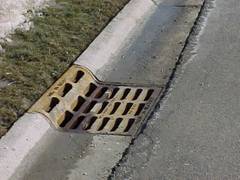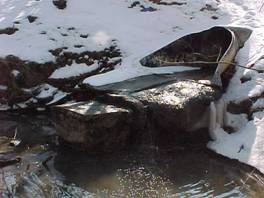
With the beginning of spring comes the rain we need to start our gardens, plant our flowers and achieve that lawn that makes our neighbors envious. While the old saying goes “April showers bring May flowers” is true, any showers can also bring potential hazards that we all take for granted. We are talking about storm water pollution.
Report illegal dumping to storm drains by calling Code Enforcement (847) 746-4019 or Public Works (847) 746-4050.
What Is Storm Water?

Storm water is water from precipitation that flows across the ground and pavement when it rains or when snow and ice melt. The water seeps into the ground or drains into what we call storm sewers. These are the drains you see at street corners or at low points on the sides of your streets. Collectively, the draining water is called storm water runoff and is a concern to us in commercial and industrial sites as well as your neighborhood because of the pollutants it carries.
Where Does The Storm Water Go After It Drains Into A Storm Drain?
Storm water that does not seep into the ground drains into systems of underground pipes, ditches or creeks and may travel for many miles before being released into Lake Michigan.
Did You Know That Not All Substances That Enter Storm Drain Inlets In The Street Can Be Removed Before They Enter Lake Michigan?

Those substances that enter the storm drain system are not treated at all! Anything poured into a gutter or a storm drain, such as used motor oil or antifreeze, flows directly to Lake Michigan.
What Are Common Contributors To Storm Water Pollution?
When it rains, oil, antifreeze, detergents, pesticides and other pollutants get washed from driveways, backyards, parking lots, and streets into storm drains and then directly to Lake Michigan untreated!
Residential
- Pet waste left on the ground gets carried away by storm water, contributing harmful bacteria, parasites and viruses to our lake. Please clean up after your pet.
- Vehicle fluids such as oil, gas, and antifreeze are the #1 surface water quality problems nationwide. Recycle used oil in a clean, sealed, plastic container. Contact SWALCO at (847) 366-9340 or visit swalco.org for disposal locations.
- Please try sweeping. Hosing off pavements washes pollutants into storm drains leading straight to the Lake.
- Deliver old paint, pesticides, solvents and batteries to disposal events listed on swalco.org.
- Street litter such as Styrofoam, plastic, and paper can be prevented by keeping bins covered and avoiding littering. Zion is windy—secure your waste!
- Yard waste like grass clippings and leaves can be composted or placed in biodegradable bags for pickup on garbage day.
Industrial
- Chemical spills, uncovered storage, and waste areas contribute to runoff. Use wash bays connected to sanitary sewers.
- Cover fueling stations and contain spills to prevent entry into storm drains.
- Never hose off spills or debris—sweep instead. All waste and process water must go to the sanitary system.
- Have cleanup kits accessible and train all staff in proper procedures.

Construction
- Materials and chemicals from construction can wash into the lake. Soil erosion also causes pollution.
- Concrete washouts should be contained and never allowed to enter gutters or streets.
- Cover all hazardous waste containers and provide secondary containment.
- Use silt fences and other BMPs to contain loose dirt and sand.
- Perform equipment maintenance in designated areas only and prevent fluid spills.
Report illegal dumping to storm drains by calling Code Enforcement (847) 746-4019 or Public Works (847) 746-4050.
With everyone’s help and cooperation we can all do our part in reducing pollutants to our creeks, streams and our source of drinking water, Lake Michigan.
City of Zion
Department of Public Works and Engineering
Community Awareness Videos for Illicit Discharge Education and Elimination
- Illicit Discharge Education and Elimination Video (English)
- Video de Eliminación y Educación de Descargas Ilícitas (Spanish)
Helpful Resources:
Zion Weather
City of Zion
2828 Sheridan Road
Zion, IL 60099
Phone: (847) 746-4000
Monday – Friday, 8:00 am – 5:00 pm
Closed Daily 12:00pm – 1:15pm
